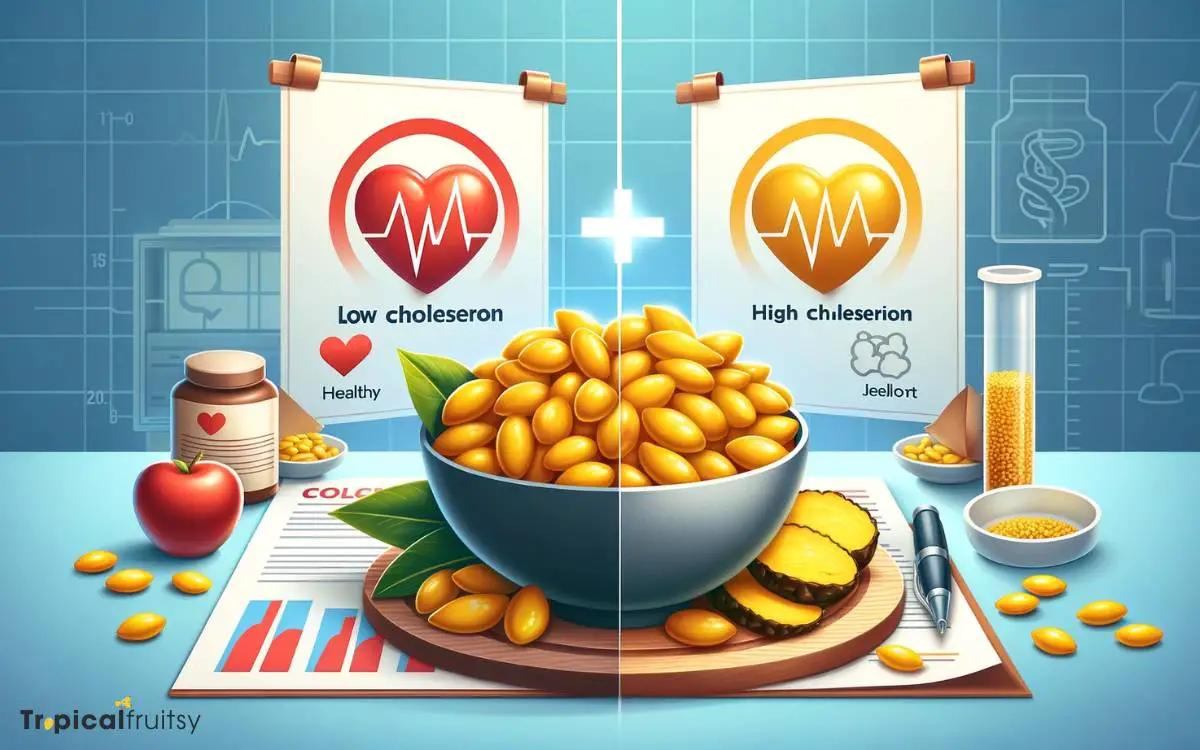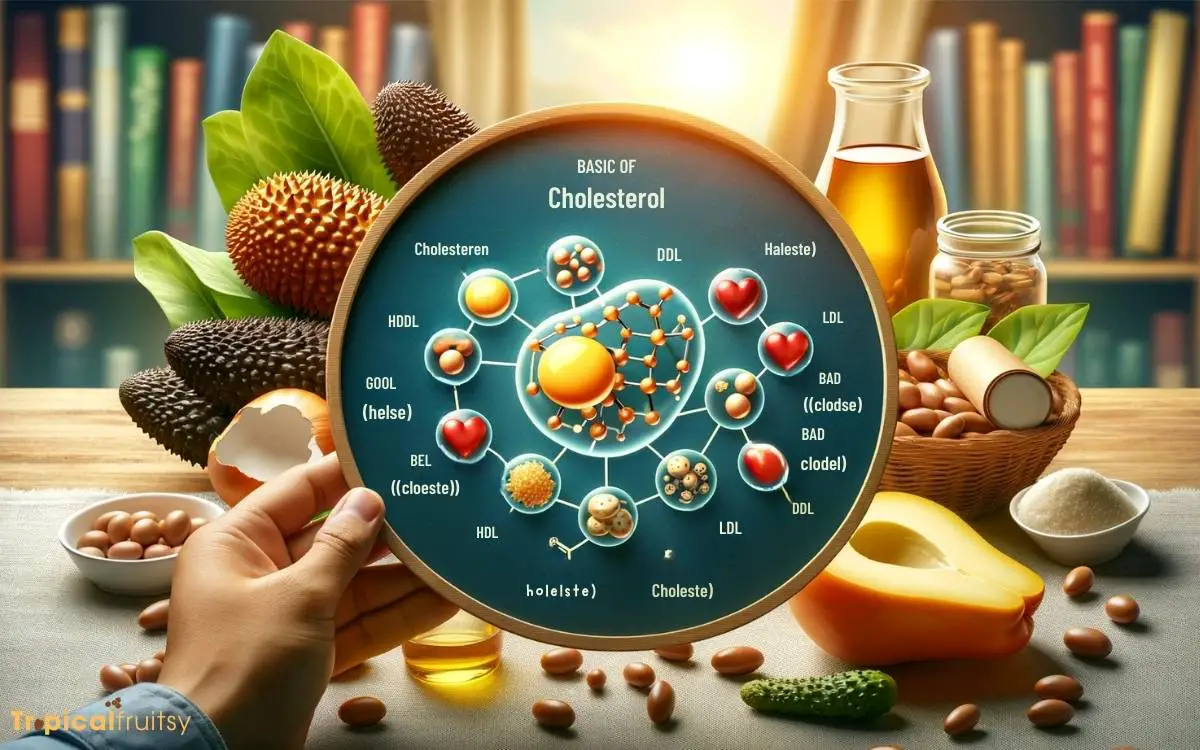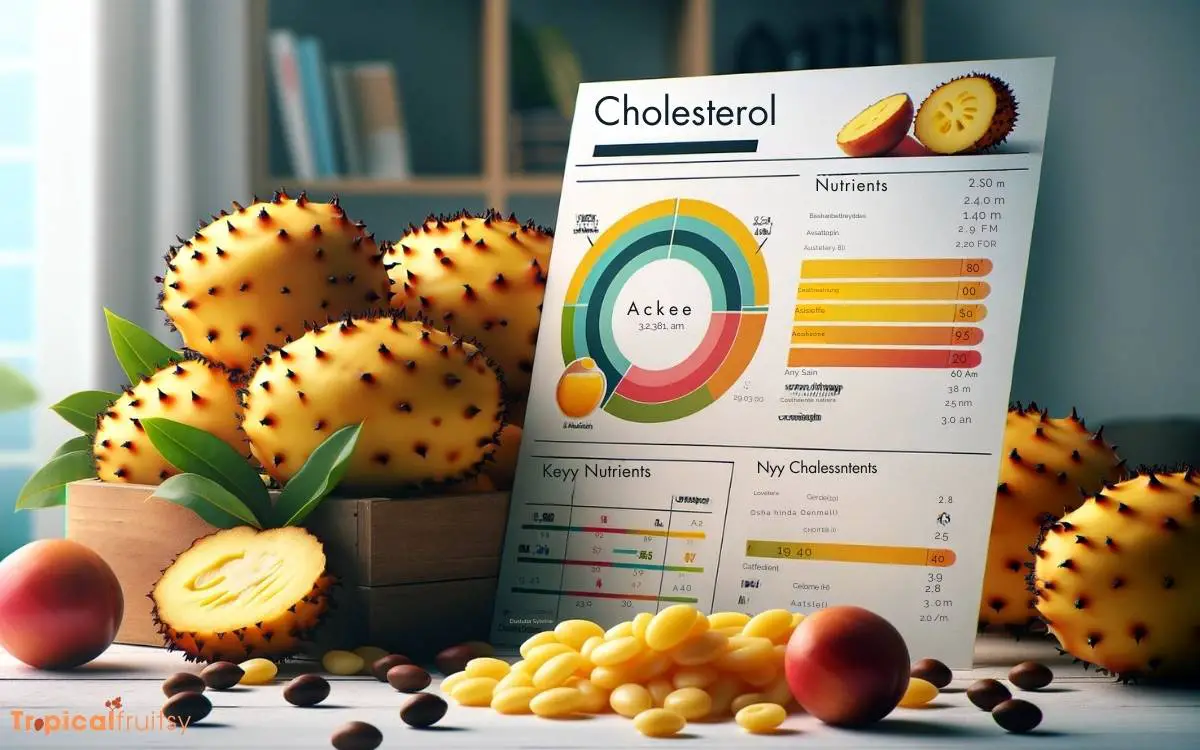Is Ackee High in Cholesterol: Debunking Myths!
Cholesterol levels are a significant concern for many individuals attentive to cardiovascular health and overall wellness.
Ackee, the national fruit of Jamaica, is often scrutinized in dietary discussions for its nutritional implications.
This introduction seeks to provide clarity on whether ackee is high in cholesterol, a matter of interest for those aiming to maintain a balanced diet.
We will delve into the nutritional profile of ackee, examining its specific cholesterol content, and explore the health benefits associated with its consumption.
Additionally, we will touch upon best practices for cholesterol management in the context of including ackee in one’s diet.
Our objective is to offer a comprehensive overview that assists in informed decision-making regarding the inclusion of ackee in a cholesterol-conscious eating plan.

Key Takeaway
Understanding Cholesterol Basics

While cholesterol is a crucial component of cell membranes and hormones, it is essential to maintain its levels within a healthy range to prevent cardiovascular diseases.
Cholesterol, a lipid molecule, is synthesized by the liver and also obtained through dietary sources, primarily animal-based foods.
It travels through the bloodstream in lipoproteins, with low-density lipoprotein (LDL) often referred to as ‘bad’ cholesterol due to its association with plaque buildup in arteries.
High-density lipoprotein (HDL), conversely, is known as ‘good’ cholesterol because it helps remove other forms of cholesterol from the bloodstream.
Balancing LDL and HDL levels is vital for cardiovascular health. Regular monitoring, a balanced diet, and an active lifestyle are recommended strategies for managing cholesterol levels effectively.
Nutritional Profile of Ackee

Following the overview of cholesterol’s role in the body, it is pertinent to examine the nutritional content of ackee to determine its impact on cholesterol levels.
Ackee, the national fruit of Jamaica, has a distinctive nutritional profile:
Macronutrients:
- Carbohydrates: Primarily composed of complex carbs, providing energy without rapid spikes in blood sugar.
- Proteins: Contains moderate amounts, essential for body repair and growth.
- Fats: Mostly unsaturated fats, which are beneficial for heart health.
Vitamins and Minerals:
- Vitamin C: Important antioxidant properties.
- Folate: Necessary for DNA synthesis and repair.
This fruit is also low in sodium and contains dietary fiber, which is advantageous for maintaining healthy cholesterol levels.
As we delve deeper into the specifics, the subsequent section will closely scrutinize ackee’s cholesterol content examined.
Ackee’s Cholesterol Content Examined

Ackee contains negligible amounts of cholesterol, making it a heart-healthy fruit suitable for those monitoring their cholesterol intake.
As a staple in Jamaican cuisine, this unique fruit is often questioned for its cholesterol content due to its rich, creamy texture.
However, scientific analysis reveals that ackee is virtually cholesterol-free. This finding aligns with the general understanding that fruits and vegetables are low in cholesterol.
In fact, cholesterol is primarily found in animal-based foods, which ackee is not. Instead, ackee offers beneficial compounds such as dietary fiber, which can actually help to manage cholesterol levels.
This aspect of ackee’s nutritional profile suggests that it can be included in a cholesterol-conscious diet without concern for adverse impacts on lipid profiles.
Health Benefits of Eating Ackee

Transitioning from its low cholesterol content, eating ackee offers several health benefits, including a rich supply of essential vitamins and minerals that support overall wellness.
Here are some of the key health benefits:
Rich in Dietary Fiber:
- Supports Digestive Health: Aids in preventing constipation and maintaining a healthy digestive tract.
- Helps in Weight Management: Fiber contributes to a feeling of fullness, which can reduce overall calorie intake.
Source of Essential Fatty Acids:
- Promotes Heart Health: Omega-3 and omega-6 fatty acids can help to maintain healthy cholesterol levels.
- Supports Brain Function: These fatty acids are vital for cognitive development and function.
The nutritional profile of ackee makes it a valuable addition to a balanced diet, contributing to health maintenance and disease prevention when consumed as part of a varied and balanced diet.
Is Ackee High in Cholesterol and Bad for Diabetes?
The ackee and diabetes analysis shows that ackee is low in cholesterol and can be a good option for those with diabetes. However, it is important to consume ackee in moderation as part of a balanced diet to manage blood sugar levels effectively.
Best Practices for Cholesterol Management

In light of ackee’s nutritional benefits for heart health, it is crucial to explore best practices for cholesterol management to further reduce the risk of cardiovascular diseases.
Adopting a diet rich in fruits, vegetables, whole grains, and lean proteins can help maintain healthy cholesterol levels.
It’s recommended to limit intake of trans fats and saturated fats, which are known to raise LDL (“bad”) cholesterol.
Incorporating physical activity into daily routines is also beneficial, as regular exercise can boost HDL (“good”) cholesterol.
Additionally, maintaining a healthy weight and avoiding tobacco use contribute to better cholesterol profiles.
Monitoring cholesterol levels through regular health check-ups enables timely interventions, while in some cases, healthcare providers may prescribe medications as part of a comprehensive cholesterol-lowering strategy.
Conclusion
The scrutiny of ackee’s cholesterol content has yielded a verdict that may ease the minds of health-conscious individuals.
The evidence has systematically dismantled the myth of ackee’s cholesterol burden, revealing a fruit that not only abstains from exacerbating cholesterol levels but also contributes positively to overall health.
As the narrative of ackee’s nutritional benefits unfolds, its integration into a balanced diet emerges as not just prudent, but potentially transformative for cardiovascular health management.






